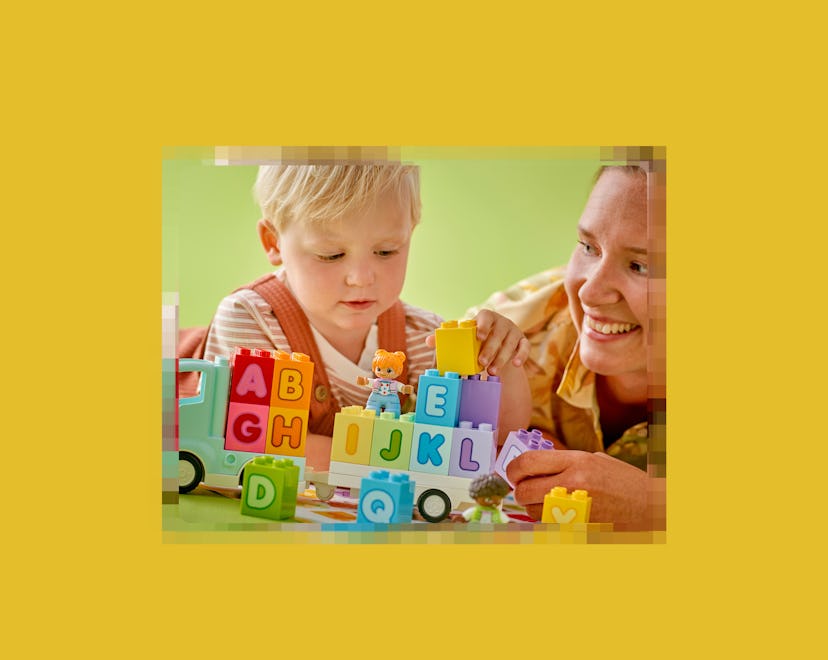Parenting

How To Prepare Your Kid To Be An Older Sibling, According To Experts
Four tips to help it feel less daunting.
Welcoming a new baby can be a big adjustment, especially for older siblings. I remember the nervousness that came when my second child arrived, and I found myself questioning if I had prepared my first child for all the changes ahead. It’s a big transition! But the good news is that you’re not alone in wondering how you can make it as seamless as possible.
To help you best navigate this special time with your firstborn, Romper teamed up with two child development experts (who also happen to be moms themselves) to share their tips on how to usher in this change the right way. Here’s what they had to say.
1. Use Play To Teach Them About Having A Baby In The House
Role-play can be a fantastic opportunity to build anticipation for a new baby’s arrival, which can easily be done by incorporating a new character into playtime storylines. “Small children are focused on play and exploration, and a new toy will allow them to pretend as they get to know their new sibling,” explains Mary Phillips, a board-certified psychiatric and mental health nurse practitioner.
Spend some quality time imagining out-of-this-world adventures with your kid’s future sibling while building a LEGO® DUPLO® 3in1 Space Shuttle Adventure, or plan an imaginary birthday celebration aboard this LEGO® DUPLO® Mickey & Minnie Birthday Train play set.
During playtime, you and your child can imagine what their new younger sibling might be like, and talk about how it will feel to see them for the first time. According to Lien, “When young children have adequate time to ask questions and even role-play what new and unfamiliar situations may look like, it can make that transition much more successful.”
Shop New Imaginative Play Toys
2. Have Simple, Honest Conversations About How Things Will Change
According to the experts, verbal preparation can help turn anxiety into anticipation. “A lot of the difficulty that sometimes comes along with welcoming a new baby stems from anxiety about the unknown, not necessarily from a reluctance to share the attention,” says Madison Lien, a Nashville, TN, area SPED educator with decades of experience assisting children through big transitions.
You can prepare your older child with the understanding that newborns communicate all their needs by crying, so it’s normal for there to be a lot of tears. Explain things like gentle hands and calm voices — and speak excitedly about the opportunities your older child will have to help out.
3. Get Them A Gift That Leads To Conversation
When it comes to speaking a child’s language, an interactive present (maybe even positioned as ‘from the new baby!’) often sends the perfect message. According to Phillips, “Sometimes making something is an easier way for kiddos to express emotions than using their words — kind of like play therapy at home!”
If you’ve chosen the new baby’s name, this adorable 36-piece LEGO® DUPLO® Alphabet Truck can help their new sibling bring it to life. Using easy-to-handle, simple-to-assemble bricks, introduce your oldest to the baby’s moniker, and start referring to them by name.
A 65-piece LEGO® DUPLO® Brick Box from their soon-to-be sibling could also provide them the opportunity to build anything they can imagine — while giving you a window into their world.
Shop Gifts From Baby
4. Assure Them That The New Baby Won’t Change Everything
Explaining to your child that their family will change in some ways, but not all ways, can give them a valuable sense of safety and security, shares Phillips. When baby arrives, help ease the transition by maintaining as much of their pre-baby routine and structure as possible. “Children thrive when they have consistent expectations and are prepared ahead of time when there are going to be expected changes to the normal routine,” says Lien.
Most of all, it’s important to remember that science supports the fact that all your child needs to make it through this transition is for you to be the parent you’ve always been. Per Phillips, “It is an evidence-based principle of mental health that maintaining and protecting structures and routines is very protective of the stability and health of individuals and families.”